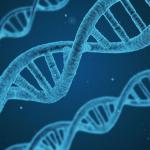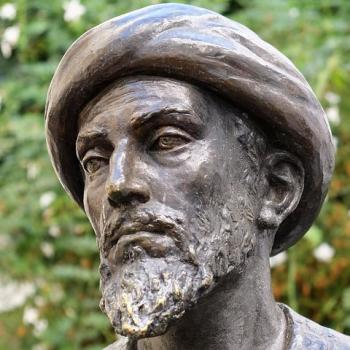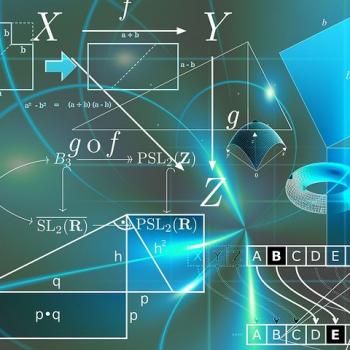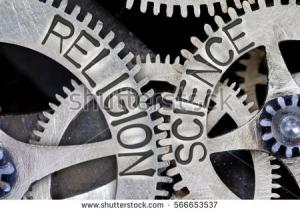 Are religion and science incompatible, or mutually exclusive? Does the knowledge of how things work “prove” that God does not exist? Conversely, does God ask the believers to forbid Science? As a medical scientist and a “religious” person myself, I will dispel some myths in a series of articles.
Are religion and science incompatible, or mutually exclusive? Does the knowledge of how things work “prove” that God does not exist? Conversely, does God ask the believers to forbid Science? As a medical scientist and a “religious” person myself, I will dispel some myths in a series of articles.
In the next several articles, I will highlight specific topics from scientific and religious perspective as they relate to the cosmos, planet earth, animal kingdom, plant kingdom and us- the humans.
But to start off, I would like to dispel some myths related to this subject.
I am sure you have heard this before:
- Scientists don’t believe in God and/or are nonreligious.
- Educated people are not religious/Educated people are mostly atheists or agnostics.
- Scripture is anti- science.
- Science is anti-religion.
This post addresses the first two myths.
Myth #1: Scientists don’t believe in God and/or are nonreligious:
Not sure how this crept into our consciousness, but throughout the history, famous scientists have talked about the connection between religion and science. Many of them held deep religious beliefs.
Let me start with me. And no, I do not count myself among “famous scientists” by any stretch of the imagination.
I am involved in medical sciences field for over 40 years as a practicing physician and educator (Director of Graduate Medical Education), I can bear witness to the interconnection between science and religion. The study of Medicine has made me ponder into our creation and made my belief in God stronger. Conversely, study of the Scriptures has made me ponder more about nature, and triggered a desire to study science more enthusiastically.
I also know countless people in the medical field and other scientists- experts in IT and computer sciences in silicon valley who like myself, are “religious” and great scientists- in fact some of the best in their fields.
Here is a small sample of the famous scientists connecting religion and science.
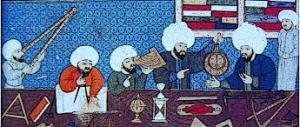 Avicenna (Ibn Sina) (980-1037): Regarded as father of early modern Medicine, he was a philosopher, astronomer, mathematician, and a physician. He was among the numerous polymaths of the Islamic golden age, inspired by the teachings of the Qur’an. His book, Canon of medicine, a medical encyclopedia, was used as the standard textbook in many medieval European universities as late as 1650. He was deeply religious and one of his famous writings include The Proof of the Truthful (al-burhan al-siddiqin) is a formal argument for proving existence of God.
Avicenna (Ibn Sina) (980-1037): Regarded as father of early modern Medicine, he was a philosopher, astronomer, mathematician, and a physician. He was among the numerous polymaths of the Islamic golden age, inspired by the teachings of the Qur’an. His book, Canon of medicine, a medical encyclopedia, was used as the standard textbook in many medieval European universities as late as 1650. He was deeply religious and one of his famous writings include The Proof of the Truthful (al-burhan al-siddiqin) is a formal argument for proving existence of God.
God, the supreme Being, is neither circumscribed by space, nor touched by time; he cannot be found in a particular direction, and his essence cannot change.
Galileo Galilei (1564-1642): Convicted by Catholic Church for heresy when he came up with his heliocentric system (i.e. the earth circles around the sun, not the other way round). He is widely viewed as someone who “stood up against the church”. In a letter to the Grand Duchess Christina of Tuscany, he wrote:
I do not feel obliged to believe that the same God who has endowed us with senses, reason and intellect has intended us to forego their use and by some other means to give us knowledge which we can attain by them. He would not require us to deny sense and reason in physical matters which are set before our eyes and minds by direct experience or necessary demonstrations.
Sir Isaac Newton (1643-1727): British scientist, astronomer, mathematician and a theologian, he was a devout Christian (though he rejected trinity).
The following is the strongest statement for supporting a convergence of religion and science:
Gravity may put the planets into motion, but without the divine Power, it could never put them into such a circulating motion as they have about the Sun; and therefore, for this as well as other reasons, I am compelled to ascribe the frame of this System to an intelligent Agent.[1]
It is the perfection of God’s works that they are all done with the greatest simplicity. He is the God of order and not of confusion.
Sir Francis Bacon: Considered father of the scientific method. He is famous for his work on gathering and analyzing data.
Here is a sample from an essay on atheism :
God never wrought miracle to convince atheism, because his ordinary works convince it. It is true, that a little philosophy inclineth man’s mind to atheism; but depth in philosophy bringeth men’s minds about to religion. For while the mind of man looketh upon second causes scattered, it may sometimes rest in them, and go no further; but when it beholdeth the chain of them, confederate and linked together, it must needs fly to Providence and Deity.
Maria Mitchell (1818 – 1889): First American female astronomer. Discovered “miss Mitchell’s comet in 1847). She was the first fellow of the American association for the Advancement of Science and American Academy of Arts and Science. It is very true that the Quaker church disavowed her and she later became a Christian Unitarian.
Scientific investigations, pushed on and on, will reveal new ways in which God works, and bring us deeper revelations of the wholly unknown.
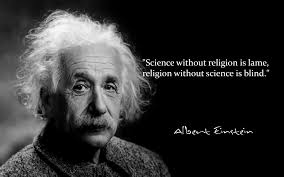 Albert Einstein: This one is a bit controversial and contradictory. Many believe he was an atheist or at least an agnostic. Others claimed he believed in God, but not the way others around him believed in God. He was critical of the fanatic atheists as well as perhaps supporting thoughts that may be considered atheists or more likely “none” today.
Albert Einstein: This one is a bit controversial and contradictory. Many believe he was an atheist or at least an agnostic. Others claimed he believed in God, but not the way others around him believed in God. He was critical of the fanatic atheists as well as perhaps supporting thoughts that may be considered atheists or more likely “none” today.
Einstein penned the letter on January 3 1954 to the philosopher Eric Gutkind.
The word god is for me nothing more than the expression and product of human weaknesses, the Bible a collection of honorable, but still primitive legends which are nevertheless pretty childish. No interpretation no matter how subtle can (for me) change this.
The same letter also contains the following, frequently quoted line.
Science without religion is lame, religion without science is blind.
So on Einstein, take your pick, and spin it as you wish.
Next: Myth#2 Educated people are not religious.
Never miss another post. Sign up for my newsletter. Click here.


